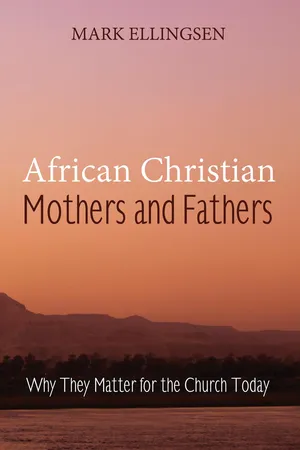
- 250 pages
- English
- ePUB (mobile friendly)
- Available on iOS & Android
About this book
After almost a millennium and a half, scholars are rediscovering the theological roots of Christianity in ancient North Africa! But we still have a long way to go in bringing these insights to the Church's consciousness. What has been needed is a careful but accessible analysis of what the great theologians of the region prior to and contemporary with Augustine actually taught about the faith, and why what they said still matters today.African Christian Mothers and Fathers is precisely the book we have needed, an explanation of the theology of these great, though in some cases forgotten, early church leaders for scholars, seminarians, pastors, and laity. Mark Ellingsen, author of an acclaimed book on the thought and life of Augustine, takes readers on an insightful tour of the theological landscape of North Africa and its thought from the late first through the early fifth centuries, and brings us back to the present enriched with ancient but fresh ideas for living the faith.
Frequently asked questions
- Essential is ideal for learners and professionals who enjoy exploring a wide range of subjects. Access the Essential Library with 800,000+ trusted titles and best-sellers across business, personal growth, and the humanities. Includes unlimited reading time and Standard Read Aloud voice.
- Complete: Perfect for advanced learners and researchers needing full, unrestricted access. Unlock 1.4M+ books across hundreds of subjects, including academic and specialized titles. The Complete Plan also includes advanced features like Premium Read Aloud and Research Assistant.
Please note we cannot support devices running on iOS 13 and Android 7 or earlier. Learn more about using the app.
Information
Anthony and Other Desert Fathers
Table of contents
- Title Page
- Preface
- Abbreviations
- Introduction: Ancient African Christianity and Why It Matters
- Chapter 1: Anthony and Other Desert Fathers
- Chapter 2: Mothers of the Desert
- Chapter 3: Clement of Alexandria
- Chapter 4: Tertullian
- Chapter 5: Origen
- Chapter 6: Commodianus
- Chapter 7: Cyprian of Carthage
- Chapter 8: Dionysius, Bishop of Alexandria
- Chapter 9: Anatolius of Alexandria and Minor Writers
- Chapter 10: Lactantius
- Chapter 11: Alexander of Lycopolis
- Chapter 12: Peter of Alexandria
- Chapter 13: Alexander of Alexandria
- Chapter 14: Arnobius
- Chapter 15: Athanasius
- Chapter 16: Macarius the Egyptian
- Chapter 17: Caius Marius Victorinus
- Chapter 18: Didymus the Blind
- Chapter 19: Contemporaries of Augustine
- Chapter 20: After Augustine
- Conclusion: Using Early African Theology Today
- Secondary Source Bibliography